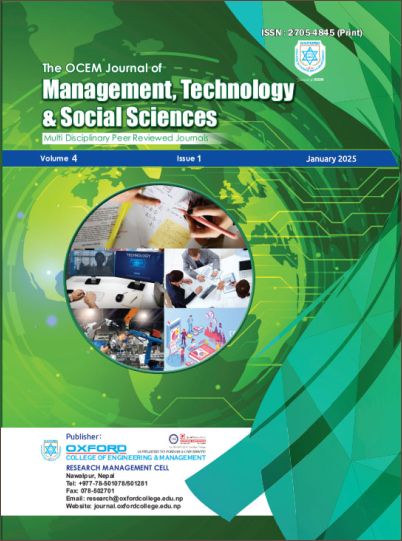Assessing User Committees’ Effectiveness in Infrastructure Projects: A Case of Palungtar Municipality, Nepal Using Exploratory Factor
DOI:
https://doi.org/10.3126/ocemjmtss.v4i1.74755Keywords:
User Committees (UCs), Infrastructure Projects, CommunityDriven Development, Performance DeterminantsAbstract
The purpose of this study is to assess the efficiency of User Committees (UCs) in the management of infrastructure projects in Palungtar Municipality, Nepal, which operates under a decentralized federal governance system. Exploratory factor analysis (EFA) and principal component analysis (PCA) are used in conjunction with one another to investigate the formulation, implementation, and performance outcomes of UCs. The perspectives of stakeholders were measured on a Likert scale with five points, and sixteen parameters were evaluated. These parameters were classified into three important factors: formation and composition, project planning and implementation, and project outcomes and performance.
Primary data were obtained from surveys and secondary data were obtained from published sources. A substantial amount of information regarding the administrative procedures, transparency, and efficiency of project execution was uncovered using EFA. Statistical studies, such as the Chi-Square and Fisher’s Exact Test, brought to light gender-based disparities in stakeholder views that were both significant and non-significant. Which also identified regions of uniformity and divergence.Despite the fact that their functionality and project outcomes have the potential to be improved, the findings reveal that UCs are confronted with obstacles such as political interference, inefficient operations, and compliance issues. Specifically, focused interventions to address gender inequities, policy refinement for inclusive governance, and attempts to build capacity to improve UC operations are some of the recommendations that have been made. The findings of this study contribute to improved governance, the creation of environmentally responsible infrastructure, and increased project success at the local level.
Downloads
Downloads
Published
How to Cite
Issue
Section
License
Copyright (c) 2025 Authors and OCEM Journal of Management, Technology & Social Sciences

This work is licensed under a Creative Commons Attribution-NonCommercial 4.0 International License.
This license enables reusers to distribute, remix, adapt, and build upon the material in any medium or format for noncommercial purposes only, and only so long as attribution is given to the creator.




